This was a fun one, and right up my alley: Friday quiz: the eminent historians. I knew nine of them, had to guess on 2, 9, and 12, and missed 2 and 9. I would have gotten 2 if I'd gone with my first thought. So, ten out of twelve.
Several commenters seconded Tomasky's mention of The Great War and Modern Memory, and I agree. Reading it was an enormously satisfying and enlightening experience. I would add that it pairs wonderfully with Modris Ecksteins's Rites of Spring: The Great War and the Birth of the Modern Age.
2010/07/25
2010/07/21
Boredom Past: Touring the German Democratic Republic
When Steerforth put up his Boring Postcards on Age of Uncertainty, I threatened to upload my photos from my trip to Germany in 1978, which I boasted would surely match, or possibly exceed, the boredom of his postcards. I took four rolls of film on that trip with my Minolta Pocket camera.
Clicking on the Behind the Iron Curtain link will take you to the whole album of 21 pictures.
The pictures weren't that great, but I learned something. I took many more pictures with that handy Minolta than I ever took with the fancy-schmancy Pentax SLR I owned after the Minolta was stolen from my car glove compartment. Portability and simplicity might make the difference as to whether I actually capture something worthwhile.
We spent most of our two weeks in West Germany, and only a couple of nights in Berlin. I suppose Bowie and Eno were around somewhere at the time. If these snaps are anything to go by, boredom must have been a problem with "really-existing socialism". You be the judge.
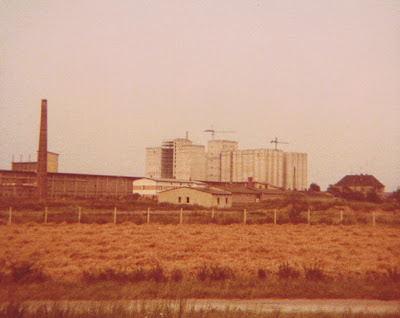 |
| From Behind the Iron Curtain, 1978 |
 |
| From Behind the Iron Curtain, 1978 |
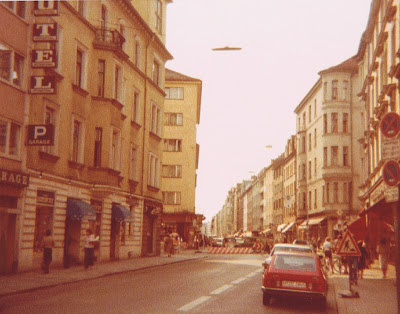 |
| From Behind the Iron Curtain, 1978 |
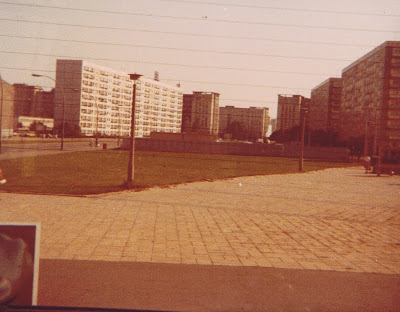 |
| From Behind the Iron Curtain, 1978 |
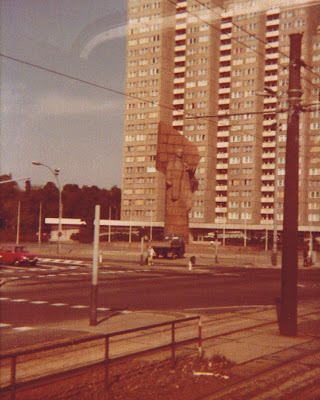 |
| From Behind the Iron Curtain, 1978 |
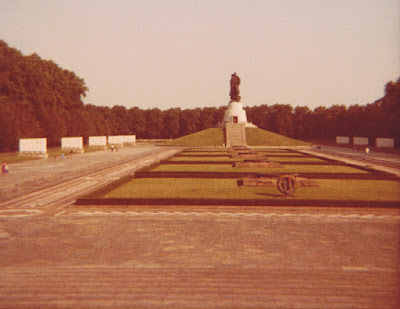 |
| From Behind the Iron Curtain, 1978 |
Clicking on the Behind the Iron Curtain link will take you to the whole album of 21 pictures.
2010/07/17
The Cruel Sea: a Voyage of the Heart
I don't often post about books on my reading list, but as I turned the last page of The Cruel Sea, by Nicholas Monsarrat today, tears welled up. He had given me a taste of the pity of war. I have read many novels about the Battle of the Atlantic in the last few months. If I had to recommend one, it would be The Cruel Sea.
Monsarrat was a journalist who had already written several novels when the war began. He joined the Royal Naval Volunteer Reserve, and commanded a frigate at the war's end. He entered the British diplomatic service after the war, and continued to write.
Dudley Pope's Convoy and Decoy are also very well-written, but are driven by a "suspense" plot device. Alexander Fullerton's Nicholas Everard novels are best at putting you on the bridge of a WWII British naval ship. Philip McCutchan's Convoy series was written more from the merchant marine point-of-view, and tends to rely on "bad guys" for drama. Douglas Reeman is well worth reading, especially The Destroyers.
Pope, Fullerton, McCutchan and Reeman were sailors who put pen to paper. Monsarrat was a writer who went to sea when duty called. The Cruel Sea is a literary catharsis, a summing up of what a man and his shipmates endured in six years at sea in wartime.
2010/07/15
The Obituary and the Codfish
I was sitting at our "satellite" reference station out by the non-fiction stacks, away from the main desk, on Monday. We made it by putting a PC and a phone on a high dictionary/atlas table. Now that Adult Services is at full-strength again, we are able to put three librarians on the floor sometimes.
The idea is to be more available to help walk-ins who have gone directly to the stacks. They may be squinting at a piece of paper with a call number on it, looking at the Dewey subject guide posters on the range ends, or just appear to be unsure where to go.
The reference desk looks remote from the floor station. When it is busy, as it was during that hour, the two librarians there are all over the place. One might be wholly occupied helping computer users: handing out reservation slips, helping them use applications, filling printers with paper. The other might be answering the phone, handing out today's newspapers, helping with the copiers, taking people to the shelves to find their books.
This time the main desk was so busy that I took reference calls at my little satellite station. One call was Mr. J., getting back to me about his mother's 1984 obituary, which I had found on microfilm. Another call was from someone wanting to know how to fry a codfish.
A woman who had been sitting behind me at a carrel had closed up her laptop and was leaving. She'd been listening to me, and she was impressed. She didn't know that the library provided a reference service. I replied that people still need help finding information. There is a lot that is still not easily accessible on the Internet, (e.g., that obituary). And, believe it or not, there are still a lot of people who aren't wired.
I formed the habit early on of looking things up for myself. I never thought of calling the library in the days before I worked in one, until one evening in the late '80's. A friend of ours was visiting us from out of town. She had come by an unusual plumed helmet which was part of the uniform of the Knights of Pythias, a fraternal order. "What are the Knights of Pythias?", we wondered. "Let's call the library!", she said, and we soon knew all about the Knights of Pythias.
The idea is to be more available to help walk-ins who have gone directly to the stacks. They may be squinting at a piece of paper with a call number on it, looking at the Dewey subject guide posters on the range ends, or just appear to be unsure where to go.
The reference desk looks remote from the floor station. When it is busy, as it was during that hour, the two librarians there are all over the place. One might be wholly occupied helping computer users: handing out reservation slips, helping them use applications, filling printers with paper. The other might be answering the phone, handing out today's newspapers, helping with the copiers, taking people to the shelves to find their books.
This time the main desk was so busy that I took reference calls at my little satellite station. One call was Mr. J., getting back to me about his mother's 1984 obituary, which I had found on microfilm. Another call was from someone wanting to know how to fry a codfish.
A woman who had been sitting behind me at a carrel had closed up her laptop and was leaving. She'd been listening to me, and she was impressed. She didn't know that the library provided a reference service. I replied that people still need help finding information. There is a lot that is still not easily accessible on the Internet, (e.g., that obituary). And, believe it or not, there are still a lot of people who aren't wired.
I formed the habit early on of looking things up for myself. I never thought of calling the library in the days before I worked in one, until one evening in the late '80's. A friend of ours was visiting us from out of town. She had come by an unusual plumed helmet which was part of the uniform of the Knights of Pythias, a fraternal order. "What are the Knights of Pythias?", we wondered. "Let's call the library!", she said, and we soon knew all about the Knights of Pythias.
2010/07/11
The Prayer of M. Hercule Poirot
As one of a diminishing number of television watchers who view programs in low-def, at the time the newspaper says they are scheduled to be broadcast, I was pleased to watch the first of what promises to be a series of feature-length Poirot episodes tonight on PBS's "Masterpiece Mystery".
Tonight, it was Murder on the Orient Express. Very dark, with Poirot, (played by an aged David Suchet), already in a grim mood from a troubling case preceding the story. No comical Captain Hastings this time. A gorgeous production, as always with the Poirot series, but almost hallucinatory, much like the later Holmes/Jeremy Brett episodes.
I don't know if this matches the books, but I've never seen Poirot make much of his religion before. Here he prays before going to sleep, and fingers his rosary a number of times. It's an old prayer, called "a prayer for protection":
Tonight, it was Murder on the Orient Express. Very dark, with Poirot, (played by an aged David Suchet), already in a grim mood from a troubling case preceding the story. No comical Captain Hastings this time. A gorgeous production, as always with the Poirot series, but almost hallucinatory, much like the later Holmes/Jeremy Brett episodes.
I don't know if this matches the books, but I've never seen Poirot make much of his religion before. Here he prays before going to sleep, and fingers his rosary a number of times. It's an old prayer, called "a prayer for protection":
O My God, I adore Thee and I love Thee with all my heart. I thank Thee for having created me, for having made me a Catholic and for having watched over me this day. Pardon me for the evil I have done this day; and if I have done any good, deign to accept it. Watch over me while I take my rest and deliver me from danger. May Thy grace be always with me.
Amen
2010/07/06
The Time I Didn't Die
It was August, 1977. I was returning to FSU after a year off at home in Winter Garden, where I had worked as an offset stripper and typesetter in a print shop.
I had driven up to Tallahassee to rent an apartment for the fall term. I would be living at Jefferson Arms, a block of flats across Jefferson Street from the law school.
I was on my way back to my parents' house on Lake Butler in west Orange County, in a yellow Volkswagen that had belonged to my grandfather. South of Gainesville, and about to enter Ocala, I approached an intersection and decided to change to the left lane.
Seconds later, I was sliding along the road on my back, with the VW close behind, slewed sideways, cracked open like an egg. I stopped sliding, and so did the VW. I stood up. I could see gasoline dripping from the forward-mounted tank onto the road. Weirdly, a deck of Tarot cards I'd had with me were strewn all over the highway, a hell of a spread. It was Palladini's Art Nouveau Aquarian Tarot. I began limping around, picking up the cards.
A UPS man ran up to me, said he couldn't believe I was alive. Other people came and made me lie down on the grass in the median. An ambulance took me to a hospital. I was checked and probed, told them to call My Father the Doctor, who took charge over the telephone and came to get me.
I never saw the driver who hit me. A car traveling at a terrific rate of speed had struck my VW just behind its left front fender. The whole front of the VW back to the windshield was sheared away on the left side. My left calf and ankle were badly bruised by the impact, and my right elbow was lacerated from my road-slide. A bone spur grew on that elbow that would break off and drift, over the years, to a spot an inch away on my forearm.
My father fretted over the VW, and found where it had been towed to. It was a total loss. He retrieved my wire-rimmed glasses from the back seat, and a handful of tarot cards.
I started the fall term at FSU walking with a brightly colored cane from Mexico that my father gave me. I leaned on it, waiting for the crossing signal at Woodward on campus one day, when I saw a woman I had met who ran Co-op Books, a radical bookstore, passing in her old Toyota Corolla. I smiled at her, and she smiled at me.
I had driven up to Tallahassee to rent an apartment for the fall term. I would be living at Jefferson Arms, a block of flats across Jefferson Street from the law school.
I was on my way back to my parents' house on Lake Butler in west Orange County, in a yellow Volkswagen that had belonged to my grandfather. South of Gainesville, and about to enter Ocala, I approached an intersection and decided to change to the left lane.
Seconds later, I was sliding along the road on my back, with the VW close behind, slewed sideways, cracked open like an egg. I stopped sliding, and so did the VW. I stood up. I could see gasoline dripping from the forward-mounted tank onto the road. Weirdly, a deck of Tarot cards I'd had with me were strewn all over the highway, a hell of a spread. It was Palladini's Art Nouveau Aquarian Tarot. I began limping around, picking up the cards.
A UPS man ran up to me, said he couldn't believe I was alive. Other people came and made me lie down on the grass in the median. An ambulance took me to a hospital. I was checked and probed, told them to call My Father the Doctor, who took charge over the telephone and came to get me.
I never saw the driver who hit me. A car traveling at a terrific rate of speed had struck my VW just behind its left front fender. The whole front of the VW back to the windshield was sheared away on the left side. My left calf and ankle were badly bruised by the impact, and my right elbow was lacerated from my road-slide. A bone spur grew on that elbow that would break off and drift, over the years, to a spot an inch away on my forearm.
My father fretted over the VW, and found where it had been towed to. It was a total loss. He retrieved my wire-rimmed glasses from the back seat, and a handful of tarot cards.
I started the fall term at FSU walking with a brightly colored cane from Mexico that my father gave me. I leaned on it, waiting for the crossing signal at Woodward on campus one day, when I saw a woman I had met who ran Co-op Books, a radical bookstore, passing in her old Toyota Corolla. I smiled at her, and she smiled at me.
2010/07/04
Bead Tapestries on display in July
If you live in the Tallahassee area, and have an appreciation of textile arts, you will want to see Linda Horton Dodson's bead tapestries, now on display at the main library on the second floor Art Wall and display case. They are the most impressive collection of work that has been shown at the library for a long time.
Subscribe to:
Posts (Atom)


